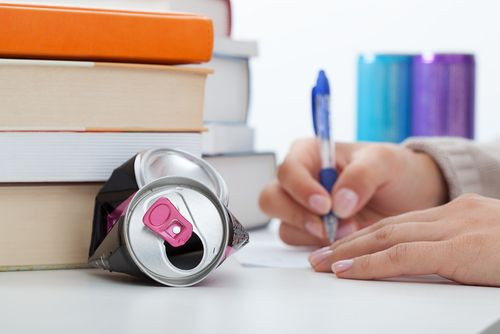The Caffeine In Red Bull Has Greater Effects On Teen Boys Than Teen Girls

Although caffeine has noticeable effects on adults, it is understood to have somewhat more dramatic effects on children and teens. However, at least one team of researchers wondered whether there might be personal differences as to how children and teens respond to caffeinated beverages — does gender, for instance, matter when it comes to drinking a Red Bull? According to Dr. Jennifer L. Temple, associate professor at the University of Buffalo, and her colleagues gender matters a great deal when it comes to the effects of high-energy drinks during the teen years. “There was an interaction between gender and caffeine dose, with boys having a greater response to caffeine than girls,” wrote the authors of the new study appearing online in Pediatrics.
Energy Drinks Marketed to Teens
Many parents and health advocates are thrilled to see kids drinking less soda these days, but unfortunately energy drinks and fancy coffees appear to have replaced them. Needless to say, this is a disturbing trend since, generally, these beverages have higher concentrations of caffeine than even soda. Many people worry caffeinated drinks will soon become even more popular within this age group, even if one study found average overall caffeine intake among children and teens has not increased in recent years. No matter what the average level of caffeine intake is, though, many parents remain concerned about individual differences in response.
To understand how caffeine, a legal and often-used substance among adults — are you sipping a cup of coffee as you read this? — may affect teens, the researchers enlisted the help of a total of 101 under-age volunteers: 52 prepubertal kids (between and 8 and 9) and 49 teens (between 15 and 17). After examining their volunteers, the researchers measured heart rates and blood pressure before and after giving them either a caffeinated beverage or a placebo. This experiment was repeated several times for all the children, who, on their repeat visits to the lab, completed questionnaires about how often they drank caffeine beverages.
What did the team discover? “We found interactions between pubertal phase, gender, and caffeine dose, with gender differences present in postpubertal, but not in prepubertal, participants,” Temple noted in a press release. While all the children showed a decrease in heart rate and an increase in blood pressure after consuming caffeine, the effect was strongest for teen boys. Meanwhile, teen girls' responses to caffeine varied over the phases of their menstrual cycle with greater decreases in heart rate during the midfollicular phase (about seven days before ovulation) and greater increases in blood pressure during the midluteal phase (about seven days after ovulation). Looking ahead, Temple and her colleagues are hoping to pursue this topic with future studies into other factors that may influence caffeine absorption and its effects on teens.
Source: Temple JL, Ziegler AM, Graczyk A, Bendlin A, Sion T, Vattana K. Cardiovascular Responses to Caffeine by Gender and Pubertal Stage. Pediatrics. 2014.



























